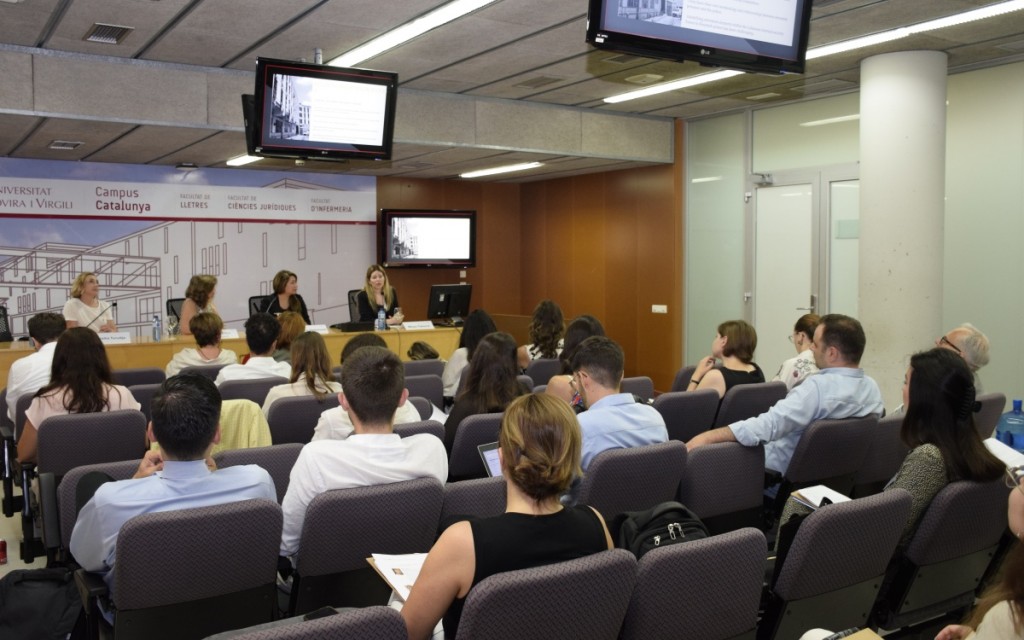07/07/2023
Women experts from the Middle East, Maghreb, Europe and the Balkans hold a debate at the URV on the prevention of violent extremism among young people
They are taking part in the Forum of the Connekt project, which is part of the UNESCO Chair on Intercultural Dialogue in the Mediterranean, and analysing gender dynamics in extremism, political violence and terrorism

They are taking part in the Forum of the Connekt project, which is part of the UNESCO Chair on Intercultural Dialogue in the Mediterranean, and analysing gender dynamics in extremism, political violence and terrorism
The Horizon 2020 research project CONNEKT held a forum at the URV’s Catalunya Campus (Tarragona) on 5th and 6th July focusing on women’s views on strategies to prevent violent extremism among young people. This EU-funded project, coordinated by the European Institute of the Mediterranean (IEMed) with the participation of the Universitat Rovira i Virgili’s UNESCO Chair of Intercultural Dialogue in the Mediterranean as a member of the consortium, studies the factors that can lead young people to radicalisation and violent extremism and recommends tools and measures for preventing violent extremism from a social and community perspective.
The project team has identified a significant gap in research on the role of women in security studies, but a gender perspective is essential to understanding international security and violent extremism. This is why the project ensures that women have a voice in debates and in the drawing up of strategies for preventing and countering violent extremism.
The CONNEKT Cross-Regional Women’s Forum, which was held in Tarragona on Wednesday and Thursday, is part of this objective. It consists of 40 women researchers, professors, activists, programme managers and journalists, who are taking part in the forum’s debates on the gender perspective in violent extremism and on the role of women in preventing and combating violent extremism from a local and community perspective. They are from countries such as Jordan, Bulgaria, Lebanon, Austria, Spain, Morocco, Bosnia and Herzegovina, Belgium and Kosovo.
Among the ideas discussed is gender bias in academic approaches, which links women primarily to peace and prevention, but does not acknowledge the part they have played in violent action and the use of gender as a tool of war. Women involved in political violence are often represented as victims, and are assumed not to have agency or a diversity of experience. Nevertheless, it is important to value their role in international security, acknowledge that they can play an active part in preventing, resisting and fighting against violent extremism, and explore gender roles in a context of power.

The forum opened with a debate between Nancy and Maya Yammout, founding sisters of the Lebanese association Rescue Me, and Mersiha Turudija from Education Builds Bosnia and Herzegovina – Jovan Divjak. In addition to the Yammout sisters, internationally renowned for their work on the rehabilitation and reintegration of prisoners convicted of terrorism in Lebanon, other participants were Rasha Saleem, director of the Politics and Society Institute (Jordan), Lura Pollozhani, researcher on North Macedonia at the Centre for Southeast European Studies at the University of Graz (Austria), Nejra Veljan, researcher at the Atlantic Initiative and member of the Radicalisation Awareness Network, and Teodora Mileska, trainer and activist for peace and reconciliation in the Balkans.
CONNEKT is a research project that analyses seven possible factors in the radicalisation of young people between the ages of twelve and thirty in seven countries of the Maghreb, the Middle East and the Balkans. Its aim is to establish a multidimensional map of the factors that can lead young people to violent extremism in these countries (Jordan, Tunisia, Morocco, Bosnia and Herzegovina, Kosovo, North Macedonia and Bulgaria) and to identify how they interact in order to assess which ones have the greatest weight. Based on its conclusions, the project will recommend tools and measures for the prevention of violent extremism from a social and community perspective applicable to the countries studied and extrapolated to other European countries.
Coordinated by IEMed, the project is being carried out by a multidisciplinary consortium that involves 14 partners from the Middle East, the Maghreb, the EU and the Balkans, including the URV’s UNESCO Chair in Intercultural Dialogue in the Mediterranean.
